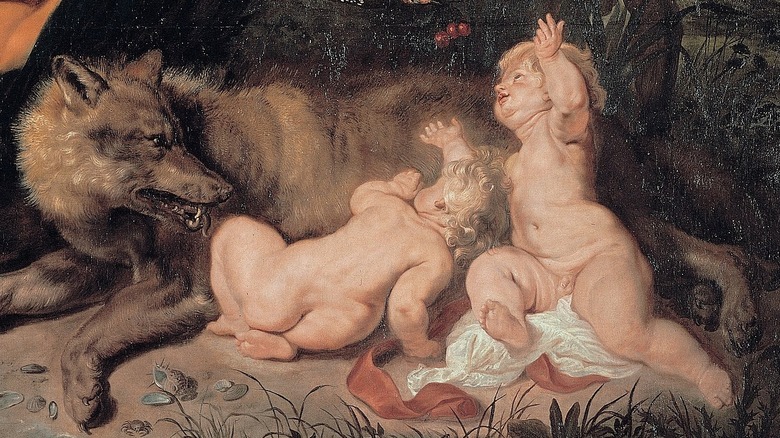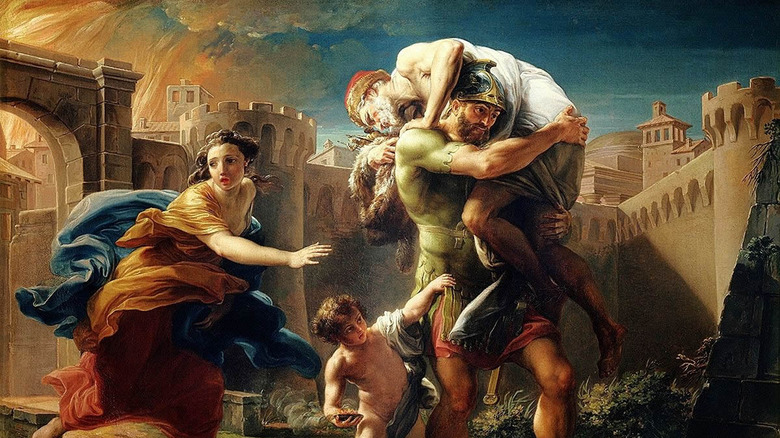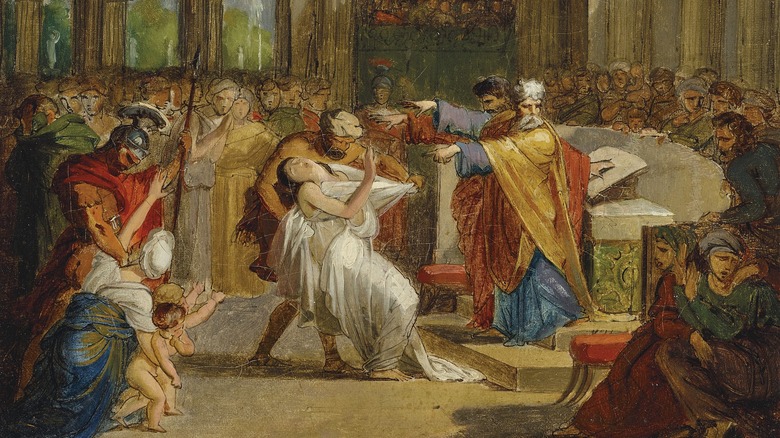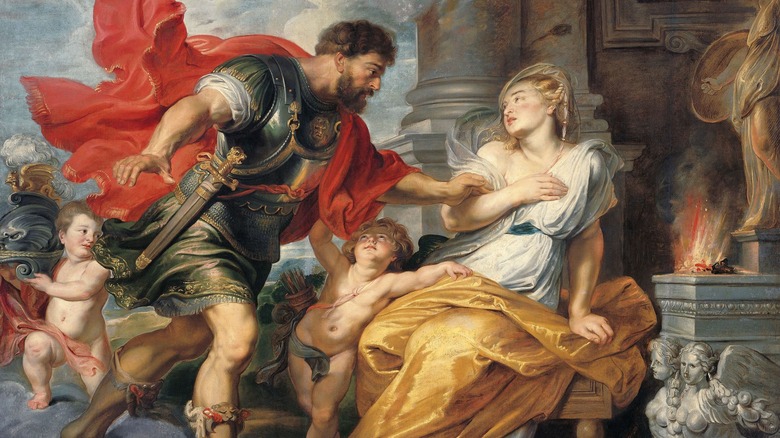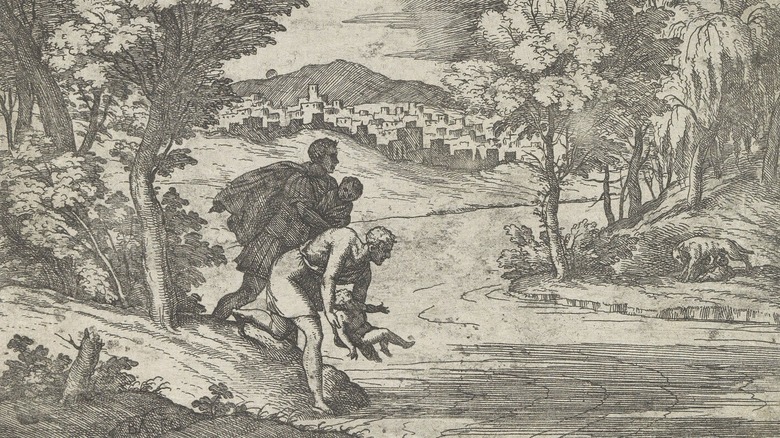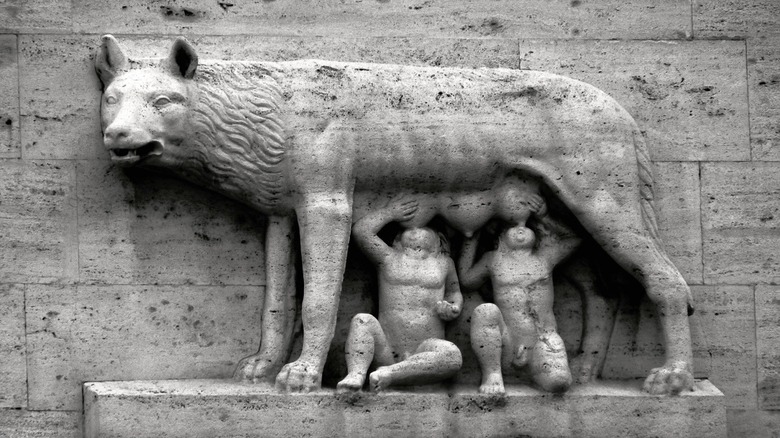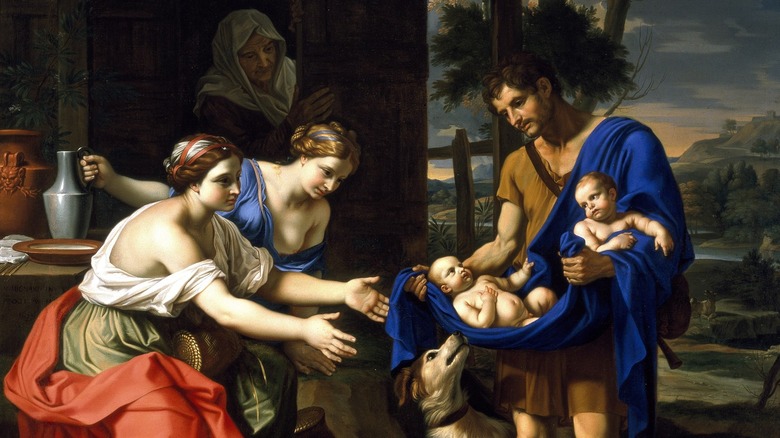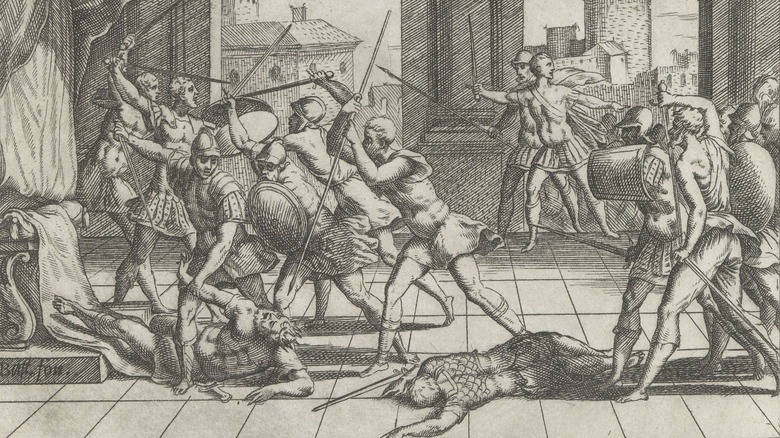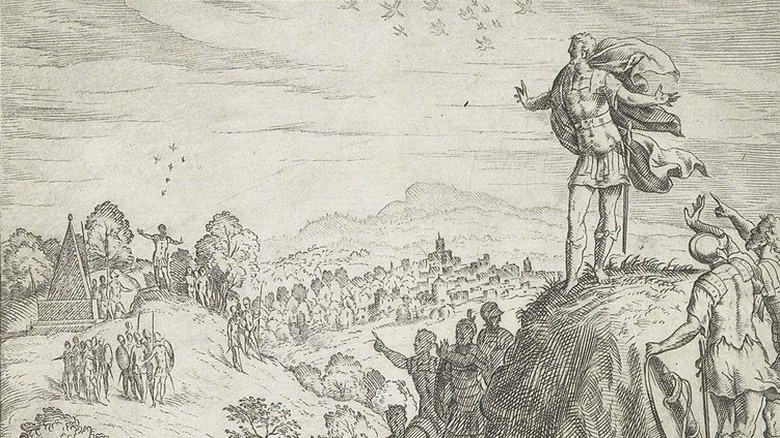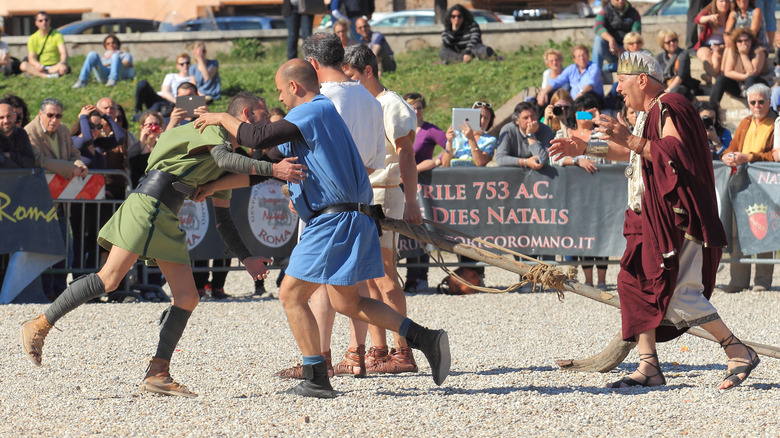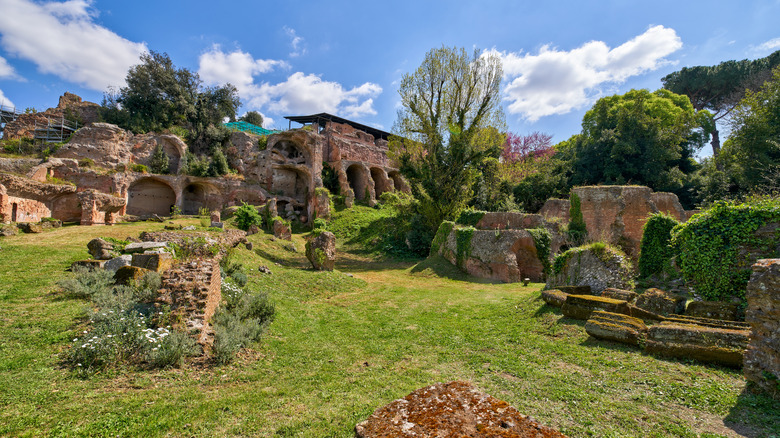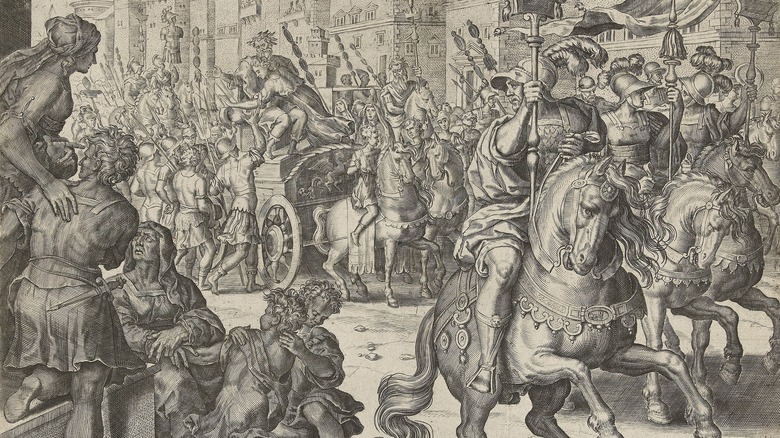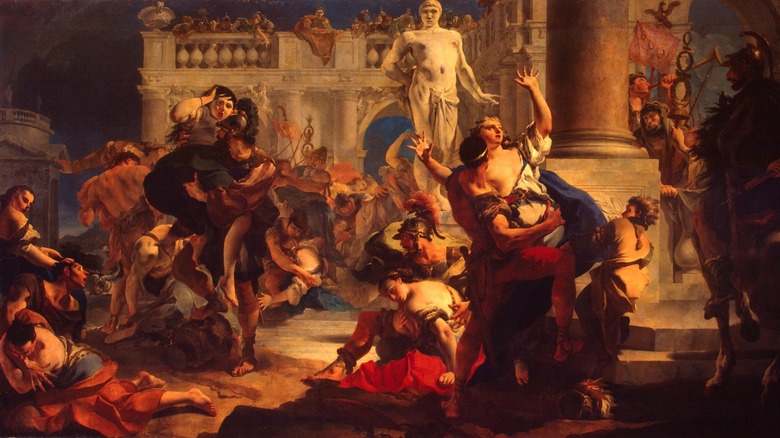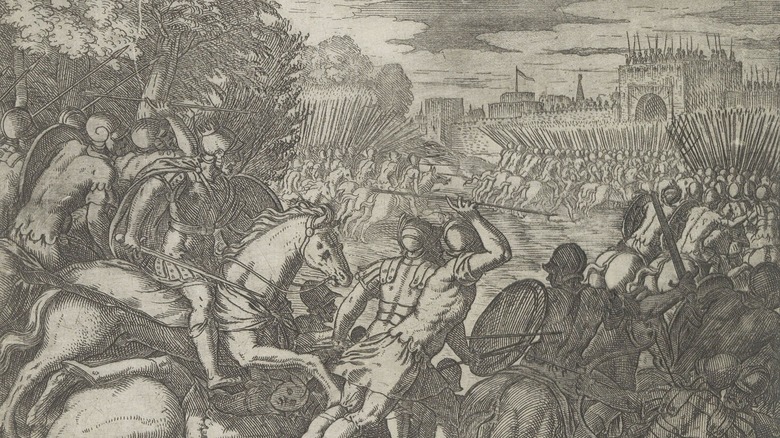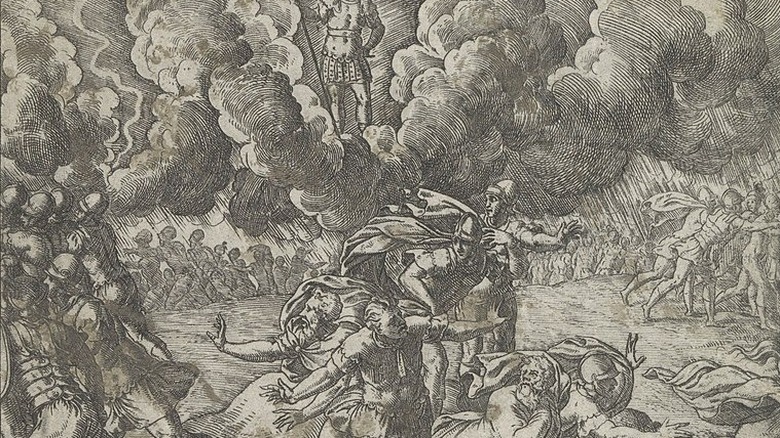The Legend Of Romulus And Remus Explained
The Romans may have brought civilization to much of the ancient world, but they did so in a brutal way: by the sword. It then comes as no surprise that the legendary founders of the empire's capital city lived harsh lives filled with warfare and murder. Since Romulus and Remus also overcame insurmountable odds several times, this was more than enough for the Romans to have no doubt that the twins were truly favored by the gods and should be worshipped as heroes.
Over the centuries, the incredible feats of Romulus and Remus were embellished in order for them to reflect the glory of the expanding empire. To ensure that future Romans had pride in their city's origins, ancient writers not only made the brothers a foundation of Roman mythology, but also closely tied their story to the older Greek tales as well. The end product is a fascinating pair of demigods deeply associated with the Hellenized god of war, Mars, the far more archaic deity, Quirinus, and some Trojan royalty, with their divine heritage thrown into the mix as well.
Romulus, especially, would combine his practically superhero-esque birth with decades of experience as the first king of Rome, cementing him as both an historic and mythic figure to the Romans at the same time. Yet for disturbing reasons, Remus would not share the same spotlight as his twin for long and, unfortunately, only became a part of his brother's epic story.
Trojan hero Aeneas was the ancestor of Romulus and Remus
After the epic Trojan War came to a dramatic end with the Greeks seizing the city, a cousin in the royal family, Prince Aeneas, managed to escape to Italy. The prince was a revered hero to the Romans because not only did Aeneas have royal blood, but he was also the son of the goddess Venus, says ThoughtCo. Once he reached the peninsula, the exiled demigod married his wife Lavinia and established his new home, the city of Lavinium, which he named after her.
When Aeneas's son, Ascanius, became a man, he went off to do his own thing and founded the city of Alba Longa. His descendants continued to rule the city for many years until 13 generations later, Numitor was set to become the next king of Alba Longa. The daughter of this ruler, Rhea Silvia, would later become the mother of Romulus and Remus.
There was a prophecy Romulus and Remus would overthrow their great uncle
As the eldest son, Numitor was supposed to rule over Alba Longa but his brother, Amulius, stole the throne from him. In defeat, Numitor fled the palace with his family and settled on a rural farm. A prophecy then arose that any sons of Rhea Silvia would depose their great uncle and restore the rightful ruler. To prevent this, Amulius forced his niece to become a vestal virgin so that she was forbidden to have children, says Classical Wisdom Weekly.
Being a vestal virgin was a highly respected religious position, so it certainly came with its perks, but it also had some major drawbacks. As a devoted servant of the goddess Vesta, Rhea Silvia had very good reason to remain a virgin. The punishment for the priestess breaking her vow of chastity was the horrifying execution of being buried alive.
Romulus and Remus were the sons of Rhea Silvia and Mars, the god of war
Amulius' first attempt to stop the prophecy failed because while Rhea Silvia was tending the holy fire in the temple, she was assaulted by the god of war, Mars, and became pregnant. Or at least that is what she told Amulius. Other versions of the tale say that Mars was deeply enamored the moment he first saw her, and the priestess soon fell in love with him as well. The ex-princess and the god then married in secret, and she faked an illness to stay hidden as much as possible until it became impossible to keep her pregnancy a secret.
Whether the couple were in love or not, Rhea Silvia's uncle refused to believe her so-called divine explanation and threw her into prison for breaking her vows, says Roma Optima. Though possibly because she was still family, Amulius let his niece live and she bore the demigod twins, Romulus and Remus.
The newborns were left in a basket on the Tiber River
After Romulus and Remus were born, Amulius remained resolute to stop the prophecy, so he ordered for the infants to be drowned in the Tiber River. The king figured that Mars would not punish him if they did not die by the sword, and instead the elements did the dirty work for him. However, the servant who was ordered to carry out the act took pity on the twins and placed them in a basket to safely float on the water.
As the boys traveled with the current, the river god Tiberinus calmed the water to keep them out of danger. Eventually, the basket reached the shore and was caught by the roots of a fig tree, which was called the Ficus Ruminalis and was considered sacred, according to Britannica. The legendary tree grew at the base of the Palatine Hill in the Velabrum swamp.
The babies were nurtured by a she-wolf
With the basket washed up on the shore, Romulus and Remus were soon discovered by a she-wolf as it walked up to the river to get a drink and heard their cries. Possibly mistaking them for wolf cubs, she was very gentle and licked their faces to soothe and quiet the wailing brothers. Then, after carrying them to the shelter of a cave, the predatory beast even nurtured the infants to keep them alive. At the same time, a woodpecker also flew into the cave more than once a day to provide the boys with berries to eat as well.
Without the intervention of nature and the gods, the newborns would surely have perished when they were at their most vulnerable, so Romulus and Remus would never forget this. In fact, the area near the Palatine Hill was so important to the twins that it would later become the future site of the city of Rome, says All That's Interesting.
Romulus and Remus were raised by shepherds
The she-wolf did not have to care for Romulus and Remus long, because they were soon found by the shepherd Faustulus who gathered them up and brought them to his home, according to "Myths of the Greeks and Romans." Faustulus and his wife, Larentia, then decided to raise the children as their own, so as the boys grew older, their adoptive dad taught them everything he knew about being a shepherd.
As young men, the demigods also became good hunters and warriors, unsurprisingly. The two then formed an armed band with friends and fellow shepherds who went after bandits to take back their stolen goods. The group did divide the spoils amongst themselves, but also gave some back to various victims of the thefts in the area as well. But when not attacking thieves, the band was also well known for pulling pranks on their enemies. Over time their fame grew as tales of their exploits spread throughout the neighboring Latin communities.
Romulus and Remus killed the king of Alba Longa
Not everyone was a fan of the popular demigods and their gang, especially among the local outlaws. One particular group of bandits despised the twins and devised a plan for revenge. During a festival, the bandits ambushed the brothers, but only managed to capture Remus while Romulus got away, according to "Oh My Gods: A Modern Retelling of Greek and Roman Myths."
At first, the bandits brought Remus to King Amulius and accused him of pillaging the farm of the former ruler, Numitor, even though it was them who had actually committed the crime. Amulius ordered that Remus be taken to Numitor to answer for his crime, not realizing the young man's true identity. Fortunately for the demigod, he and his grandfather quickly figured out they were family and were overjoyed at finally being reunited.
Remus then called for Romulus and the two of them were told in detail about how their great uncle had cruelly seized power. Furious over the treatment of their true mother and grandfather, the twins gathered their band, advanced to the palace, and brutally beheaded Amulius. Afterwards, the brothers restored Numitor to the throne of Alba Longa.
Romulus and Remus disagreed on where to build their new city
With the rightful ruler back at Alba Longa, Romulus and Remus decided it was time to start their own city. Both brothers agreed the foundation should be in the area of the seven hills, but could not agree on an exact location, says Civitatis Rome. Romulus wanted to start building on the Palatine Hill since it was where they were saved by the she-wolf, but Remus preferred the Aventine Hill.
To solve the problem, the brothers tried to rely on an augury in which the movement of birds was interpreted as a way of knowing what the gods wanted. However, the results did not settle anything because while Romulus saw 12 birds, which was more than Remus' six, Remus argued that he saw his birds first and that was more important than the amount. With no resolution, the brothers continued their dispute.
Remus was probably murdered by Romulus
With neither brother backing down, their forces divided and there was a standoff. As a result, Romulus began to build defenses for his settlement, including a wall and trenches. Remus thought his brother's puny fortifications were ridiculous, so he made a fool out of Romulus by jumping over the wall, according to DailyHistory.org.
What happened next was under debate, but there is no doubt that Romulus was enraged by the insult. The Roman historian Livy stated that the gods struck down Remus for disrespecting the results of the augury, while another account says that it was one of Romulus' men who killed Remus. Though most versions of the story have Romulus being so angry at this brother that he murdered him with a spear, or a spade strike to the head. Oddly enough, the Romans seemed to have no problem with this fratricide because most of the ancient sources say the death was the will of the gods.
Romulus founded the city of Rome
In his account, Livy states that both the death of Remus and the founding of Rome happened the same day: April 21, 753 B.C. Although Remus was buried by his brother with full funeral honors, Romulus named the city only after himself. Yet, what would later become the capital of one of the world's greatest empires was not much to look at in the beginning. The small settlement only consisted of several huts made of wood, straw, and mud, according to "Famous Men of Ancient Rome: Lives of Julius Caesar, Nero, Marcus Aurelius and Others."
Over the years, the number of houses grew, along with temples and other civic buildings constructed as more people came to live in the city. Romulus became the first king of the city, but he also created the Senate to help govern the city, which consisted of members from all the wealthiest and most powerful families known, as the patricians.
Many of city's first citizens were bandits, deserters, and murderers
The new king understood that the settlement would remain puny with only the band of followers he and his brother had gathered. So, Romulus desperately wanted to increase the population of his fledgling city and allowed all sorts of people to enter regardless of their backgrounds, including runaway slaves, criminals, fugitives, and exiles, according to the World History Encyclopedia. A lot of those who came had criminal pasts, but the demigod ruler offered them all an opportunity to start over.
Even though they came from various different tribes and cities, the new citizens worked together to build more homes and buildings, and added to the fortifications for Rome. The city had begun to prosper, but there was one major problem: nearly all of the Romans were men, while very few women had come to the new settlement. If Rome was going to have any chance for success, the men needed to find wives.
Romulus' men kidnapped the women of their neighbors
Since the Romans already had a bad reputation, any attempts to marry the women of neighboring peoples ended in failure. So, to bring more women to the city, Romulus and his people came up with a horrific plan. According to History, the Romans invited the nearby Sabines to a festival with the intent to abduct their women and forcefully take them as wives, while the Sabine men were drunk and had their guard down.
The Romans sent messengers not just to the Sabines, but to many other neighboring cities as well, hoping to entice people to come through the promise of entertainment and the possibility to win prizes. In honor of the supreme god, Jupiter, the religious festival would have horseracing, combats, and various games. Many could not resist the opportunity for some fun and came to the mass gathering, especially the Sabine tribespeople of the nearby mountains. Once the Romans sprung their trap, the festivalgoers were too shocked to act and could not prevent them from succeeding in their deceitful plan.
The Sabines were furious over the betrayal and declared war on Rome, fighting to a brutal stalemate for three long years. However, the Sabine women eventually intervened to put an end to the bloodshed, forcing the two sides to make peace. For a time, the Sabine king, Titus Tatius, ruled jointly with Romulus, and both the Romans and Sabines coexisted with no more conflicts.
Romulus expanded Rome's boundaries
Romulus did not have to share power for long because the Sabine king was killed by ambassadors from Lavinium, the city founded by Aeneas. The Roman ruler must not have been upset over the turn of events because he did nothing to avenge Tatius' death. Instead, Romulus kept the peace between Lavinium and Rome with a new treaty, says Historiae Romanorum at the University of Dallas.
After taking control over the Sabine territory, Romulus also incorporated the Kingdom of Alba Longa into the Roman lands when his grandfather, Numitor, eventually died. The king ruled by himself for nearly 40 years, and throughout much of his reign, the Roman army often battled with the Etruscan cities, Veii and Fidenae, keeping the soldiers happy with many victories and a lot of plunder to bring home. On the other hand, the Senate and the other patricians had grown to hate the near constant warfare.
Romulus became a god after his death
One day, Romulus gathered his warriors and the rest of the Roman people on a large field. The king was prepared to give a speech but was interrupted by a terrible storm. The downpour was intense and the lightning struck dangerously close by, causing everyone to rush back to the safety of their homes in a panic. To make matters worse, a thick fog had rolled in to make it very difficult for everyone to see where they were going.
Once the bad weather subsided, the Romans returned to the field but Romulus had disappeared, according to "Famous Men of Ancient Rome." Word then began to spread that Mars had come down for his son and carried him up on a gold chariot to live amongst the gods. This was then later confirmed by a citizen named Julius who claimed that Romulus visited him and said that Rome was destined to become the greatest city in the world. As a Roman god, the former king became known as Quirinus, which was also one of the names of Mars. Over time, the founder of the city was just as important as the god of war to the belligerent Romans.
In reality, the patricians probably used the chaos of the storm to take out a political threat that had become too powerful. Romulus may have founded Rome, but it had become their city too, and they simply refused to make any more sacrifices for his endless wars. If true, Rome's first king would only then become the first among numerous rulers murdered by rival senators in the city's long history.
